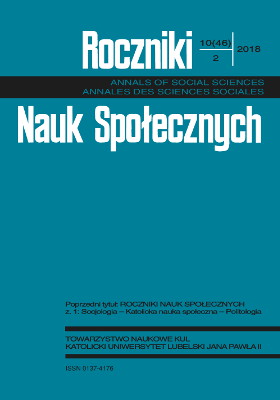Rola ojca w procesie „przedłużonego dorastania” dzieci
Father Involvement and Prolonged Transition to Adulthoodof Children
Author(s): Mariola BieńkoSubject(s): Social Sciences, Sociology, Family and social welfare
Published by: Towarzystwo Naukowe KUL & Katolicki Uniwersytet Lubelski Jana Pawła II
Keywords: fatherhood; family; autonomy; maturity; adulthood; young adults
Summary/Abstract: The modern family in European and American culture is undergoing significant transformations in terms of structure, the types of relations, the roles and functions taken by its members. The democratization of social life, as well as the process of further individualization has led to fading traditional, unified models of parenting strictly determined by the norms of a given social circle. In western culture the family functions according to a new model of internal family relations, where the formerly inviolable rule of parents is questioned. Civilizational changes in the area of norms which determine life style have influenced a change in perception of the father’s role. Fathers, who in most societies played the role of a formerly unquestionable authority, no longer stand as guides in the old sense of the word. They have no decisive influence in the process of passing on culture and are forced to recognize the independence, initiative and innovative tendencies in development of their maturing children.Fatherhood is a “social practice” currently tied to myths, stereotypes, contradictory judgments and evaluations. This article displays the psychosocial and economic determinants of postponing adulthood in the perspective of a father-child relationship, formulated in the conclusions from interviews with 42 young adults, ages 27-38, living with their parents.
Journal: Roczniki Nauk Społecznych
- Issue Year: 46/2018
- Issue No: 2
- Page Range: 29-49
- Page Count: 21
- Language: Polish

